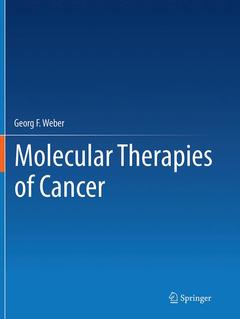Description
Molecular Therapies of Cancer, Softcover reprint of the original 1st ed. 2015
Author: Weber Georg F.
Language: English
Subject for Molecular Therapies of Cancer:
Approximative price 158.24 €
In Print (Delivery period: 15 days).
Add to cartPublication date: 10-2016
Support: Print on demand
Publication date: 08-2015
488 p. · 21x27.9 cm · Hardback
Description
/li>Contents
/li>Biography
/li>Comment
/li>
Molecular Therapies of Cancer comprehensively covers the molecular mechanisms of anti-cancer drug actions in a comparably systematic fashion. While there is currently available a great deal of literature on anti-cancer drugs, books on the subject are often concoctions of invited review articles superficially connected to one another. There is a lack of comprehensive and systematic text on the topic of molecular therapies in cancer. A further deficit in the relevant literature is a progressive sub-specialization that typically limits textbooks on cancer drugs to cover either pharmacology or medicinal chemistry or signal transduction, rather than explaining molecular drug actions across all those areas; Molecular Therapies of Cancer fills this void. The book is divided into five sections: 1. Molecular Targeting of Cancer Cells; 2. Emerging and Alternative Treatment Modalities; 3. Molecular Targeting of Tumor-Host Interactions; 4. Anti-Cancer Drug Pharmacokinetics; and 5. Supportive Therapies.
INTRODUCTION
SECTION I: GENERAL PRINCIPLES
SECTION II: MOLECULAR TARGETING OF CANCER CELLS
1. DNA DAMAGING DRUGS
1.1. ALKYLATING AGENTS
1.2. ANTIBIOTICS
1.3. TOPOISOMERASE INHIBITORS
1.4. ANTI-METABOLITES
2. DRUGS THAT SUPPRESS PROLIFERATION
2.1. ANTI-MITOTIC AGENTS
2.2. DIFFERENTIATING AGENTS
2.3. INDUCERS OF APOPTOSIS
3. MOLECULAR INHIBITORS OF GROWTH SIGNALS
3.1. SMALL MOLECULE KINASE INHIBITORS
3.2. INHIBITORS OF ONCOGENE FUNCTIONS
3.3. ANTIBODIES
4. ANTI-METASTASIS THERAPY
4.1. INTEGRIN INHIBITORS
4.2. CD44 INHIBITORS
4.3. MMP INHIBITORS
4.4. CHEMOKINE RECEPTOR INHIBITORS
4.5. TGF- IHIBITORS
4.6. BONE TARGETING AGENTS
4.7. OTHERS
5. INDUCTION OF SENESCENCE
5.1. TELOMERASE INHIBITORS
6. COMBINATION CHEMOTHERAPY
6.1. TREATMENT OF HEMATOLOGIC MALIGNANCIES
6.2. TREATMENT OF SOLID TUMORS
SECTION III: EMERGING AND ALTERNATIVE TREATMENT MODALITIES
7. GENE THERAPY
7.1. GENE SILENCING
7.2. SUICIDE GENES
7.3. ONCOLYTIC VIRUSES
7.4. GENE DELIVERY
7.5. OTHER STRATEGIES
8. DRUGS WITH DIVERSE MODES OF ACTION
SECTION IV: MOLECULAR TARGETING OF TUMOR-HOST INTERACTIONS
9. HORMONE THERAPY
9.1. ANTI-ESTROGENS
9.2. ANTI-ANDROGENS
9.3. CORTICOSTEROIDS
10. IMMUNOTHERAPY
10.1. IMMUNOTOXINS
10.2. ENGINEERED ANTIBODIES
10.3. ANTIGEN BASED IMMUNOTHERAPIES
10.4. CYTOKINE BASED IMMUNOTHERAPIES
10.5. IMMUNE RESPONSE MODIFIERS
10.6. AUTOLOGOUS THERAPIES
10.7. OTHER REGIMENS
11. ANTI-ANGIOGENESIS
11.1. VEGF ANTAGONISTS
11.2. FGF-2 ANTAGONISTS
11.3. THALIDOMIDE RELATED DRUGS
11.4. INTEGRIN BLOCKERS
11.5. ENDOSTATIN AND ANGIOSTATIN
11.6. OTHERS
SECTION V: ANTI-CANCER DRUG PHARMACOKINETICS
12. DRUG DELIVERY AND DRUG TRANSPORT
12.1. TARGETING WITH DRUG CONJUGATES
12.2.
12.3. NANO-PARTICLES
12.4. SOLUBILIZERS
12.5. VARIOUS
13. DRUG METABOLISM
13.1. CYP450
13.2. FLAVIN MONOOXYGENASES
13.3. GST
13.4. OTHERS
14. PRODRUG ACTIVATION
14.1. PHOTODYNAMIC THERAPY
14.2. RADIO-SENSITIZATION
15. DRUG RESISTANCE
15.1. INCREASED EFFLUX
15.2. DECREASED UPTAKE
15.3. ANTI-APOPTOSIS
15.4. MUTATIONS IN THE DRUG TARGET
15.5. ALTERED REPAIR OF DRUG INDUCED DAMAGE
15.6. OTHER MECHANISMS
SECTION VI: SUPPORTIVE THERAPY
16. PROTECTION FROM ADVERSE EFFECTS
16.1. ANTI-EMETICS
16.2. PROTECTION FROM ANEMIA
16.3. IMMUNE RECOVERY
16.4. CARDIOVASCULAR PROTECTION
16.5. ANTI-OXIDANTS
16.6. ANTI-CACHEXIA DRUGS
16.7. PROTECTION FROM HEPATOTOXICITY
16.8. PROTECTION FROM URINARY TOXICITY
16.9. PROTECTION OF THE GASTROINTESTINAL TRACT
16.10. TREATMENT OF DERMATOLOGIC REACTIONS TO CHEMOTHERAPY
16.11. ELECTROLYTE BALANCE
16.12. REPRODUCTIVE PROTECTION
16.13. OTHERS
17. PAIN MANAGEMENT
17.1. NON-STEROIDAL DRUGS
17.2. OPIOID DRUGS
17.3. OTHERS
18. PREVENTIVE TREATMENT
18.1. VACCINES
18.2. CHEMOPREVENTION
Provides a comprehensive treatise on anti-cancer drugs
Covers all aspects of molecular cancer drugs, including medicincal chemistry, pharmacology, and signal transduction Includes sections on anti-metastasis therapy and combination chemotherapy?
Explores emerging and alternative treatment modalities
Includes supplementary material: sn.pub/extras




